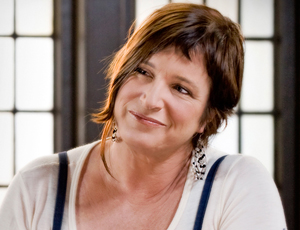Sex writer Susie Bright to donate archives to Cornell
By Gwen Glazer

A quarter of a century ago, Cornell University Library began to gather books, letters, photographs and ephemera related to sexuality – much of which was ignored or shunned by academia and society at large.
That bold idea grew into the library’s Human Sexuality Collection, which will celebrate its 25th anniversary with several events, beginning with a donation of archival materials by best-selling feminist sex author Susie Bright. Bright gives a free public talk on campus, Jan. 23 at 4:30 p.m. in Lewis Auditorium, Goldwin Smith Hall.
Bright is a leading voice on sexual politics; she broke new ground publishing the lesbian sex magazine “On Our Backs” in the 1990s and remains on the cutting edge of publishing as an author, editor and podcaster.
“I've admired Cornell’s archives of GLBT history for years – really, it's one of the world’s finest when it comes to sexual representation, and the range of erotic and sexual identity in full flower,” Bright said. ‘The ‘On Our Backs’ legacy – the hundreds of women we published who took such great risks, and our thousands of readers who had their lives changed by this vision of lesbian sexual self-determination – deserve the perfect spot.”
In her “Sexual State of the Union Address,” Bright will discuss the status quo of sexuality in the nation’s bedrooms and courtrooms, from the most personal to the most global consequences.
Bright is giving Cornell her archives, which document sexual politics over the past 35 years and show the development of her own activism and publishing. Her collection contains the written history of “On Our Backs,” costumes the publishers wore at magazine fundraisers, and detailed documentation of the feminist sex wars and censorship battles that defined lesbian publishing in the ’80s and ’90s. An expert on the history of the pornography business and its censorship, Bright also is donating videos and documents recording these controversies.
“As a researcher and writer, Cornell's library has been a beacon to me, a place where respect for America’s cultural history – the outlier and the avant-garde – is unsurpassed,” Bright said.
The Human Sexuality Collection will host anniversary events throughout the year, with announcements of new initiatives, the arrival of more collections, and art exhibitions in Ithaca and New York City.
The Human Sexuality Collection was formed when David B. Goodstein ’54, longtime publisher of “The Advocate,” and Bruce Voeller, a scientist and early leader of the National Gay Task Force, formed a friendship out of their mutual desire to help society combat static conceptions and fear of sexuality – and to see a major research library preserve the materials needed for this research. With their support, and approval from Cornell’s Board of Trustees, the library established the collection in 1988.
“Bright has served as a trusted source of information as well as an inspiration for my generation of feminists,” said Kate McCullough, associate professor in English and in feminist, gender and sexuality studies. “I am thrilled to be a part of the institution that houses Bright’s papers.”
“I have worked with Susie Bright for years and admired her smart and sensitive work in the field of sex,” said Beth Anderson ’80. “As a Cornell alumna and a friend of the Cornell Library, I am thrilled that Susie’s important documents will be part of the library’s collections for generations of students and researchers.”
Bright’s visit is sponsored by Cornell University Library with the Feminist, Gender and Sexuality Studies Program; Haven; the Office of the Dean of Students; Lesbian, Gay, Bisexual and Transgender Studies Program; Lesbian, Gay, Bisexual and Transgender Resource Center; the Rose Goldsen Lecture Series; and the Society for the Humanities.
Gwen Glazer is the staff writer for Cornell University Library.
Media Contact
Get Cornell news delivered right to your inbox.
Subscribe